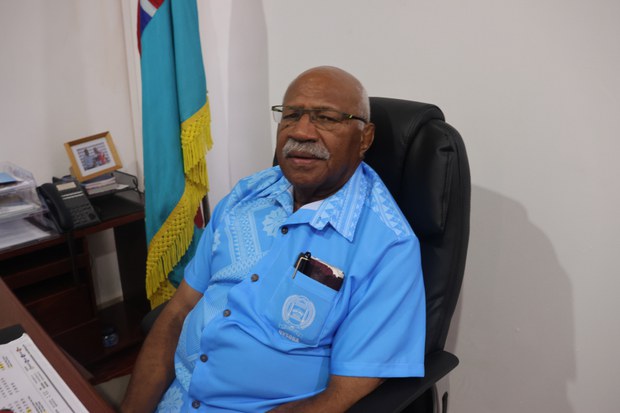Fiji opposition says glitch with election app calls results into question
2022.12.14
Suva, Fiji
 People’s Alliance Party leader and former Fiji Prime Minister Sitiveni Rabuka sits next to a Fijian flag in his office on Dec. 15, 2022.
People’s Alliance Party leader and former Fiji Prime Minister Sitiveni Rabuka sits next to a Fijian flag in his office on Dec. 15, 2022.
The votes in Fiji’s election are still being counted but one of the country’s leading politicians, Sitiveni Rabuka, is already calling the results into question.
A problem with the Fijian Election Office’s smartphone app that distributed provisional results to the public is the basis for the concerns of Rabuka, who leads the opposition People’s Alliance.
“We’re not accepting the state of the count up to now,” Rabuka, a former Fiji prime minister, told BenarNews on Thursday, a day after Fijians voted.
“We were accepting it until the so-called glitch last night. We’re not happy with what happened after the announcement there had been a breakdown in the system,” he said.
The election result will decide whether Prime Minister Frank Bainimarama can extend a 16-year hold on power that has brought stability to the Pacific island nation but also entrenched the military in politics.
Both Bainimarama and Rabuka are former military men who came to power in coups that have defined Fijian politics since the late 1980s.
The Fijian Election Office took its results app offline for several hours, starting late Wednesday evening.
Supervisor of Elections Mohammed Saneem said an interrupted upload of data to the app caused a misallocation of candidate IDs, which meant a candidate with little support was assigned a large number of votes.
Before the app problem, the People’s Alliance Party led by Rabuka was ahead of Bainimarama’s Fiji First by a considerable margin, but the proportion of polling stations counted was low.
Rabuka said his party wants a recount and, if it doesn’t get a satisfactory response from the election office, it will mount a legal challenge to the election results.
“I just call on the people to remain calm and allow the redress processes to go [on],” he said.
“When we are satisfied that everything we have asked for has been done – a recount or restart of counting, manual, without the threat of having another IT glitch – then that is all the physical proof we can have of what the will of the people has been,” he said.
Saneem said at a news conference that the integrity of the election depends on the vote-counting processes rather than the app.
Earlier in the week, an international observer group said there had been no significant irregularities in the early voting held in remote areas. It has about 90 officials monitoring the election.
The election office stopped releasing updates of provisional results on Thursday morning and said the official vote count had begun. The final tally of votes is expected on Sunday.
About 60% of polling stations had been counted in the final update of provisional results and showed Fiji First with about 46% of votes. The People’s Alliance had nearly 33% and a smaller party allied with it had 9%.
If the official results are similar, Fiji First would have a slim majority in parliament because the votes of parties that poll less than 5% are discarded when allocating seats.
Before the vote, analysts had said Bainimarama faced an uphilll battle to stay in power.
Fiji First’s support dropped to 50% in the 2018 election from about 59% in 2014, which was the first election in eight years after Bainimarama seized power in a 2006 coup.
Freedom House, which promotes civil rights and democracy, says a repressive climate in Fiji eased following the 2014 election. However, the ruling party still frequently interferes with opposition activities and the judiciary is subject to political influence, it says.
A media law has also stifled criticism of the government, but Fiji First’s popularity has been challenged by the economic fallout of the COVID-19 pandemic in tourism-reliant Fiji, high inflation and concern about the government’s legal tactics against critics and opposition politicians.
Fiji has had four coups since independence in 1970, partly a legacy of British colonial policies that restricted the economic activities of indigenous Fijians while bringing tens of thousands of indentured laborers from India in the late 19th century and early 20th century.
The first two coups, in 1987, led by Rabuka, then a lieutenant colonel, highlighted the ethnic and religious divisions that had developed in Fiji over decades. The coups followed the election defeat of a predominantly indigenous Fijian political party.







